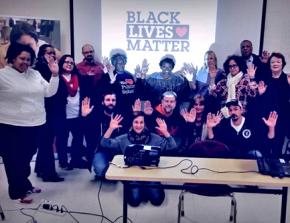Educators must stand against racism
In this statement, , the social justice caucus of the North Carolina Association of Educators, asserts the importance of teachers standing up against racism.
AS PUBLIC school educators, we are, first and foremost, facilitators of the near-limitless growth potential of human beings. We wake up early, stay up late, and pour every ounce of creativity and energy that we have into the task of helping young people find and achieve their purpose. That is our lives' purpose, and it is guided by the belief that every human life is sacred, and each of our students can leave their communities better than they found them.
In the past few weeks, this vocation has been particularly heartbreaking. The failure of grand juries to indict the murderers of both Michael Brown and Eric Garner, in addition to the police violence that has claimed the lives of 12-year-old Tamir Rice, Akai Gurley and too many others to name here has left us facing classrooms of young people searching for answers to incredibly complicated and infuriating questions: Why does this keep happening? If these are the people who are supposed to protect me, how can I ever feel safe?
We have cried for and with our students. We have created space for them to talk. We have created lessons that challenged their assumptions. We have helped them try to understand truths that are challenging for even us to face. But most importantly, we have affirmed that their lives matter and that we are committed to their emotional and physical safety. Without affirmation and safety, no student can achieve their potential.

Thus, Organize 2020 is endorsing the nationwide effort to assert a fact that is obvious, yet sadly controversial: Black Lives Matter.
IN DECLARING this fact, we recognize these most recent and publicized injustices are nothing new. We remember Emmett Till, Eleanor Bumpurs, Amadou Diallo, Trayvon Martin, and so many more. The extrajudicial murder of Black people in this country has deep roots in the dehumanizing system of white supremacy that once defined Black bodies as property, and persisted in the form of lynchings in the nearly 100 years of Jim Crow that followed emancipation. Since the end of Jim Crow, policing, prisons and the court system have replaced the mob and the whip as the principal mechanisms of violence that disrupt and threaten Black lives. It is precisely because this tragedy is not new that we need to assert, over and over again, that the lives of Black people matter.
We believe deeply that the lives of all people matter. As teachers, our lives are constructed around this fact. Shouting loudly that Black Lives Matter does not negate our commitment to ALL of our students. In fact, we believe that challenging all of our students and colleagues to recognize the innate value of Black lives will help them grow, and that the quality of life for all who live in our communities will improve when we value the lives of everyone. Since so many of our Black students struggle to trust that our society values them, we must go out of our way to affirm that their lives, specifically, matter.
Every quality educator knows that each of our students has different needs, and that none of their lives ends at our classroom doors. When our students are hungry or struggle emotionally, they don't learn as well as they otherwise could. When our students witness or experience violence, their brain development suffers. To maximize student potential, educators and our school systems must acknowledge these facts and meet the needs of our students in different ways. Right now, Black students need to know that we value them, no matter what the legal system and police actions tell them.
Historically, when Black people have fought for a more democratic society, the lives of all people have improved. Each time a barrier to Black people's potential has been erected, our whole society has suffered. Organize 2020 stands with those who proclaim that Black Lives Matter, and we commit our work in the classroom and the community to making this slogan a reality.
#BlackLivesMatter
First published at Organize 2020.


